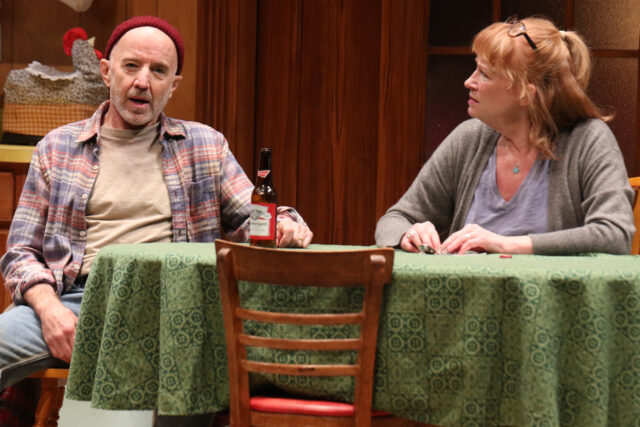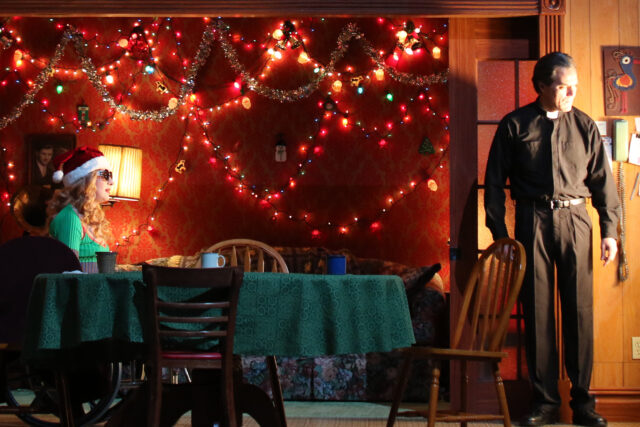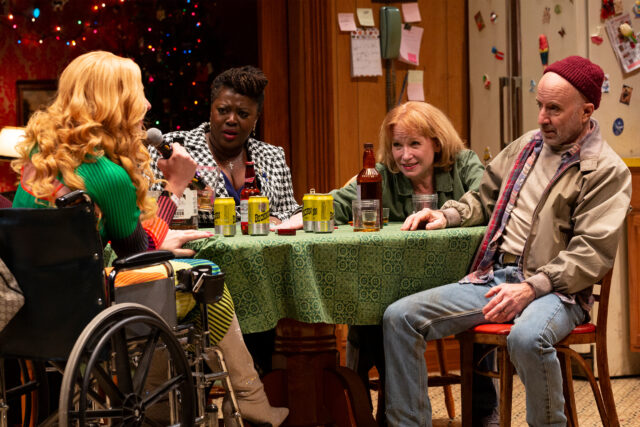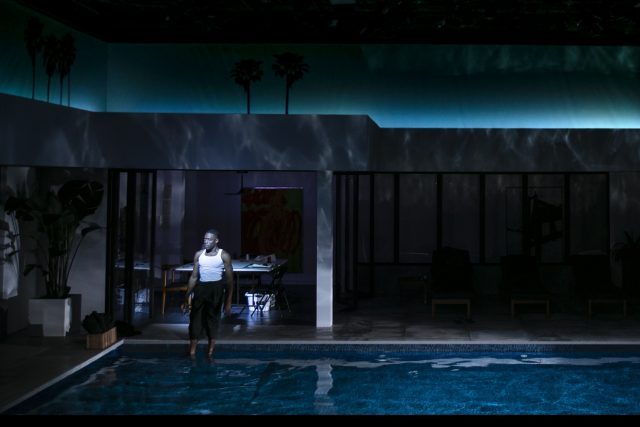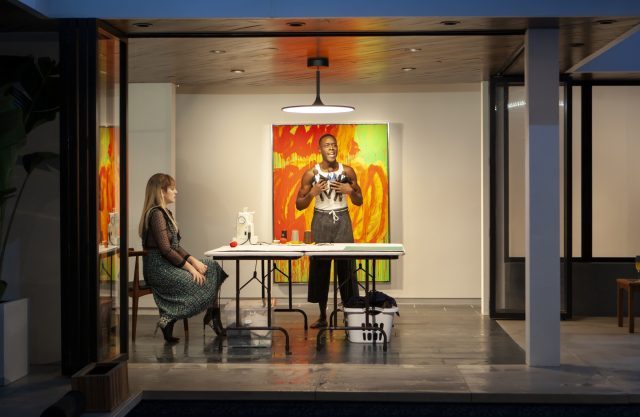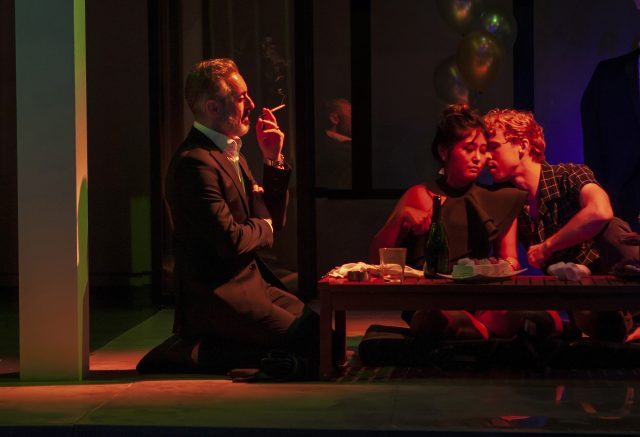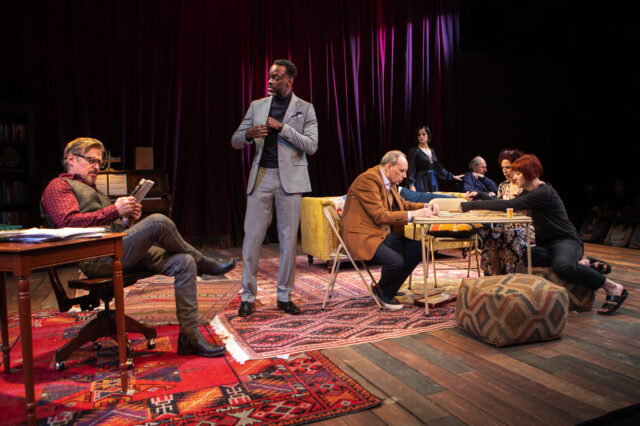
Thomas Bradshaw moves Anton Chekhov’s The Seagull to modern-day Woodstock in New Group world premiere (photo by Monique Carboni)
THE SEAGULL/ WOODSTOCK, NY
The New Group at the Pershing Square Signature Center
The Romulus Linney Courtyard Theatre
480 West 42nd St. between Tenth & Eleventh Aves.
Tuesday – Sunday through April 9, $38-$107
212-244-7529
thenewgroup.org
www.signaturetheatre.org
While sitting in the first row watching Thomas Bradshaw’s outrageously funny and psychologically insightful modern-day adaptation of Anton Chekhov’s The Seagull, called The Seagull/Woodstock, NY, I was reminded that I have never seen a traditional version of the play, one that uses the original dialogue and time period. And that’s just how the Russian playwright wanted it.
In John J. Desmond’s relatively serious and straightforward 1975 Williamstown production, which went straight from stage to film, Konstantin (Frank Langella), a young playwright whose mother, Irina (Lee Grant), is an aristocratic star, tells his uncle, landowner Sorin (William Swetland), about Irina, “She knows of course I haven’t got any use for the theater. She loves the theater. Seems to her she’s working for humanity and the sacred cause of art. But to me her theater today is nothing, nothing but a mass of routine and stale conventions.” Sorin responds, “Well, we can’t do without the theater, my dear boy.” A fanciful dreamer, Konstantin declares, “We need new forms, Uncle! New forms we must have. And if we can’t have those, we shall have nothing at all.”
Thus, Chekhov himself essentially demands new interpretations, and in New York City we have received them with such challenging works as Elevator Repair Service’s 2022 Seagull at Skirball and Aaron Posner’s 2016 Stupid Fucking Bird at the much-lamented Pearl.
Bradshaw tears down conventions in his 160-minute version (with intermission) for the New Group, in which the action has been moved from a late-nineteenth-century Russian country estate to a contemporary riverfront home in artsy Woodstock in Ulster County. The play begins with the actors warming up on a wooden proscenium platform, doing physical and vocal exercises; the audience sits on three sides of the stage as they get an advance glimpse of the cast and try to figure out who’s portraying who. After several minutes, everyone joins in a singalong of Crosby, Stills, Nash & Young’s 1970 classic “Our House,” the lyrics of which will run counter to what we are about to experience: “Our house is a very, very, very fine house / With two cats in the yard / Life used to be so hard / Now everything is easy ’cause of you.” (CSNY appeared at the 1969 Woodstock festival but did not sing that song; the next year, however, they released the song “Woodstock,” written by Joni Mitchell, in which they proclaim, “Got to get back to the land / Set my soul free.”)
A close-knit, motley crew is gathering by the river on Darren (Daniel Oreskes) and Pauline’s (Amy Stiller) property to see a new play by Kevin (Nat Wolff), a twenty-six-year-old ne’er-do-well living in the shadow of his narcissistic mother, Irene (Parker Posey), a star of the stage. Before she says hello to her friends and relations, she is already loudly complaining that there is no soy milk for her coffee. Kevin has written the one-person, two-hour show for Nina (Aleyse Shannon), a twentysomething with no boundaries. Kevin is in love with Nina, who will soon take a liking to the older William (Ato Essandoh), a well-known writer who is Irene’s current partner. Meanwhile, Pauline and Darren’s daughter, Sasha (Hari Nef), pines away for Kevin. Also on hand are Sasha’s teacher husband, Mark (Patrick Foley), brain surgeon Dean (Bill Sage), and retired lawyer Samuel (David Cale), Irene’s best friend.
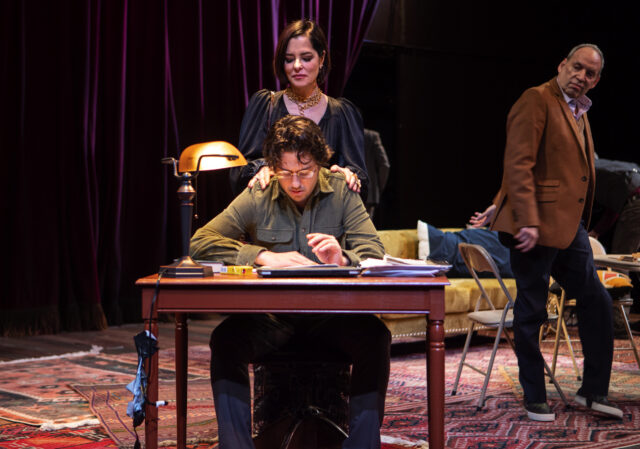
Mother (Parker Posey) and son (Nat Wolff) have an awkward relationship in The Seagull/Woodstock, NY (photo by Monique Carboni)
When Sasha ridicules Kevin’s set, which consists solely of a cast-iron bathtub and a curtain that goes around it, Mark needles her, saying, “Tonight their artistic souls will unite on this very stage.” Right before Kevin’s play starts, Samuel tells Nina, who lives nearby and whose banker father is not a fan of her interest in theater, “Woodstock nurtures the artistic soul. Bob Dylan and Van Morrison wrote some of their best music here. [Your father] should have bought a place in the Hamptons if he wanted you to be a banker.”
Bradshaw fills the show with contemporary references, from Dylan and Morrison to viagra, #metoo, Alec Baldwin, wokeness, the Wailers, Donald Trump, Bertrand Russell, Instagram, Stephen Colbert, Tracy Letts, dramadies, and Paula Vogel’s How I Learned to Drive. He also takes on race, class, sexual identity, and truth but in subtler ways than he has in such previous works as Southern Promises, Intimacy, and Burning, or at least more subtle for him.
But Bradshaw and director Scott Elliott’s central target is art itself. “Hi, I’m Nina. I’m not a character in Kevin’s play. I’m me,” Nina says as the play-within-a-play kicks off. “Kevin hates artifice. So do I. I am myself, or I am no one. Who are you? Are you, you? Or are you hiding from yourself?” She adds, “The fourth wall tonight is broken. So that means I can see you just as clearly as you can see me. I can see everything about you. I can see things even you can’t see.” The fourth wall of Bradshaw’s play was broken immediately as well, when the actors got onstage and we all sang, and the lights stay at a level that allows us to see everyone in the audience.
Nina, who is biracial, then discusses “the N word,” actually saying it in full several times, which confronts her audience as well as Bradshaw’s, a writer who often strives to make his audience squirm in their seats. “I get that the historical legacy of the word is offensive. But does the word itself have any power?” she asks. Then, in true Bradshaw fashion, she switches to one of his favorite topics. “We recently went through a long period of isolation. Everyone in our society did. It was a period of intense loneliness for me. And for many of you, I bet. And what were we all doing during that time? Masturbating. Why can’t we talk about it? We all do it. I’d rather discuss masturbating than the weather.” Bradshaw understands that theater itself can be a kind of masturbation; in fact, in Intimacy, a character not only pleasures himself (using a prosthetic) in view of the audience but launches a sticky white substance into the crowd, some of which landed on the head of a major critic, who was none too happy. (One friend joked to me that Anton’s last name should be “Jackhov,” pronounced “jackoff.”)
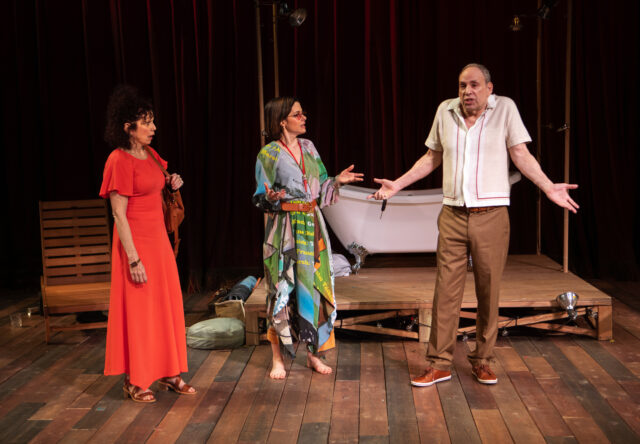
Irene (Parker Posey) gets in the middle of Pauline (Amy Stiller) and Darren (Daniel Oreskes) in New Group world premiere at the Signature (photo by Monique Carboni)
After Kevin’s play ends, Irene tells Nina, “You were very good, in spite of my son exploiting you.” Nina replies, “Oh no. It was my choice. And he totally respected me, as an actress, and as a woman of color.” Irene says, “So you didn’t feel the least bit weird pretending to, uh, touch yourself, onstage?” Nina explains, “Oh, I wasn’t pretending. I had to really do it, in order to crack the artifice of normal theatrical conventions. There’s nothing real about realism. That’s Kevin’s philosophy. He believes in hiding nothing.” That is Bradshaw’s philosophy as well.
Throughout the show, the actors and stage crew bring chairs and tables on and off Derek McLane’s intimate set, which includes a narrow lower level around the platform where people in the first row can get comfy and put up their feet — until some of the actors walk across it. At times Elliott choreographs the play like it’s a dance, expertly guiding the cast of ten in the small space, who enter and exit through the aisles.
The cast seems to be having a lot of fun, and that feeling is infectious; the play moves at such an intoxicating pace that you might be disappointed when it’s over, wanting to spend more time with these well-developed, endearing, annoying, and frustrating people. “I think my character would feel more authentic if we knew more of her backstory. Right now the play feels abrupt,” Nina tells Kevin, who argues, “It is abrupt. That’s the point. We’re subverting typical American Theater. We’re getting right to the heart of the matter instead of making our audience suffer through an hour of incredibly dull backstory.”
Posey (Hurlyburly, Fifth of July) is a burst of summer sunshine as Irene, in flowery dresses, bobbed hairdo, and gloriously fake smiles. (The costumes are by Qween Jean, with lighting by Cha See and sound by Rob Milburn and Michael Bodeen that keep the audience immersed in the show.) Wolff (Buried Child, The Naked Brothers Band) wonderfully captures the constant nervous wreck that is Kevin, while Shannon (Charmed, Black Christmas) glistens as a strong young woman ready to take charge of her life, especially sexually, and Nef (Des Moines, “Daddy”) is a bundle of fear as the disillusioned Sasha. Cale, Essandoh, Foley, Nef, Oreskes, Sage, and Stiller round out the uniformly solid cast.
Bradshaw (Thomas & Sally, Fulfillment) and New Group artistic director Elliott (Mercury Fur, Sticks & Bones) also take a hard look at aging, not just in theater but in life. Irene is well aware that it is getting more difficult for her to find roles because she is in her fifties, and Samuel is facing serious health issues that affect the elderly.
“Is there anything new anymore? Are there any new stories? New forms? Or is everything just a new spin on something old? A reinvention of the comfortable and familiar?,” Kevin asks William. The Seagull/Woodstock, NY provides just the right answers to those questions.
